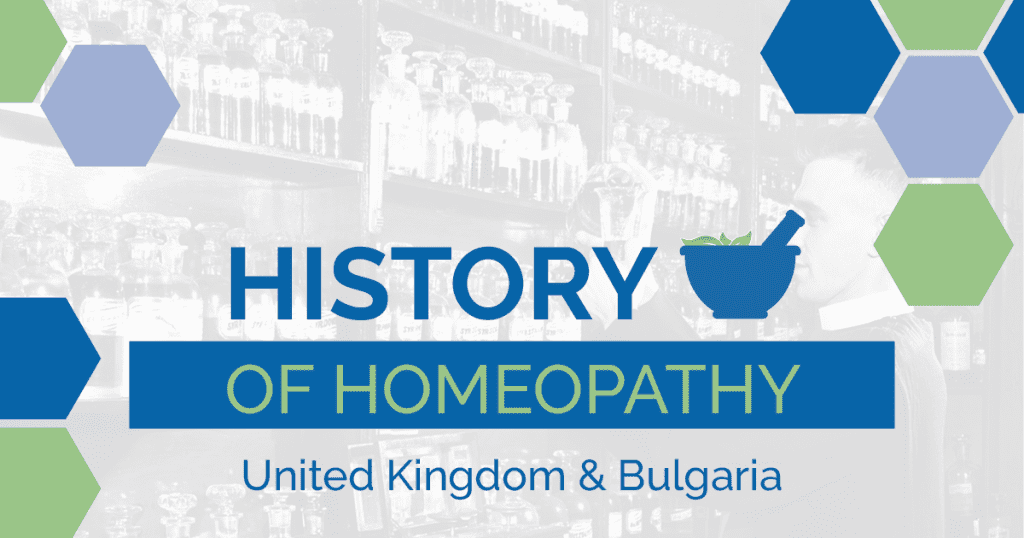Snapshots from There and Then: History of Homeopathy

In honor of AAHP’s 100th anniversary year, we’re looking back at the history of homeopathy to learn how the medical modality spread worldwide. Readers will discover startling vignettes of unexpected paths and outcomes. Many may know much about homeopathy here and now, but we hope you find our “There and Then” series informative and interesting!
United Kingdom
Homeopathy was introduced to the United Kingdom by Dr. Quinn in the 1830s and 1840s. A frequent guest of Hahnemann and his protégés, Dr. Quinn familiarized the royal family to this mode of therapy, which has been used by every British monarch since Queen Victoria. Due to Quinn’s efforts and the resulting support from the aristocracy and royal families, homeopathy gained an easy acceptance in British medical circles. This was further helped by the many German relatives of the British Royal family, who also used homeopathy. With this basis of support, homeopathy was not significantly challenged for nearly 150 years.
A homeopathic hospital was founded in London in 1850 and the British Homeopathy Journal has been continuously published for almost 180 years. A homeopathic pharmacy opened in 1839 and operated until 1962 when the last of the family line passed away.
While the number of users of homeopathy slowly grew, initially it was predominantly the medical profession and their wealthy clients that were responsible for strengthening homeopathy’s status decade after decade. This can be seen in the wealthy patrons (Tate, Cadbury, York, Rowntree, etc.) who funded a number of homeopathic hospitals. The flip side was homeopathy was seen as belonging to the upper class; thus its inroads with the lower class was spotty, at best. However, as time passed, there was a marked decline in the number of licensed practitioners, and laypersons began to fill the void across the country.
One can be tempted to say, “the sun never set on the British homeopathic empire.” The expansion of homeopathy across the globe was certainly due, in part, to British subjects in all classes, who traveled to, and settled in, so many disparate places. In so doing, homeopathy was also widely taught by them, and then further spread by many who had been recipients of those teachings.
The burgeoning back-to-nature movement of the 1970s also created renewed professional interest in homeopathy. By the early 1980s, the number of practicing homeopaths already exceeded the peak reached a century earlier. More colleges and trainings were also quickly established — with more than 20 options available in the U.K. The Faculty of Homeopathy sets standards in education and homeopathic practice across a wide range of medical specialties. This group provides domestic courses and has been invited abroad to help initiate or strengthen homeopathic practitioner education in other countries.
Homeopathic products are easily found at all chemists and are available from more than a half dozen domestic companies located in various parts of the British Isles, with delivery often by the Royal Mail service.
Bulgaria
Homeopathy has been present in Bulgaria since the late 1850s when a physician returned from a five-year training in France. Other homeopathic doctors and dentists soon began using the homeopathic method; its place in Bulgaria was unofficial but widespread for decades. In 1938, changes in regulations allowed every doctor to prescribe homeopathic medicines. Just six years later stemming from the socialist revolution, there was a ban on homeopathy as a “false teaching.” For more than 40 years, homeopathy was simply “forgotten.”
Its revival began in 1992 when a course was organized by the U.K.’s Royal College of Classical Homeopathy. Along with a number of subsequent courses, homeopathy has rapidly grown throughout the country. Three years after the initial course, homeopathic medicines were legally recognized as medicines, which then required to be registered. Ten years later, a new act limited the use of a number of unconventional therapies, including homeopathy, to only medical doctors and dentists.
By the late 1990s, European companies were making their homeopathic products available in Bulgaria. Soon after, a domestic pharmacy was able to prepare attenuations to order. Unfortunately, not every homeopathic product is available, though homeopathic veterinary products are possible to legally obtain. Homeopathy continues to be increasingly recognized, more registered homeopathic practices are accessible for patients, and additional education opportunities for practitioners continue to become available.
References:
http://www.homeoint.org/morrell/articles/pm_brita.htm
Personal correspondence Steve Mann, Director of External Regulatory Affairs & QPPV, Nelson’s (U.K.)
https://hpathy.com/homeopathy-papers/homeopathy-in-bulgaria/
